Lawsuit challenges new Alabama congressional districts
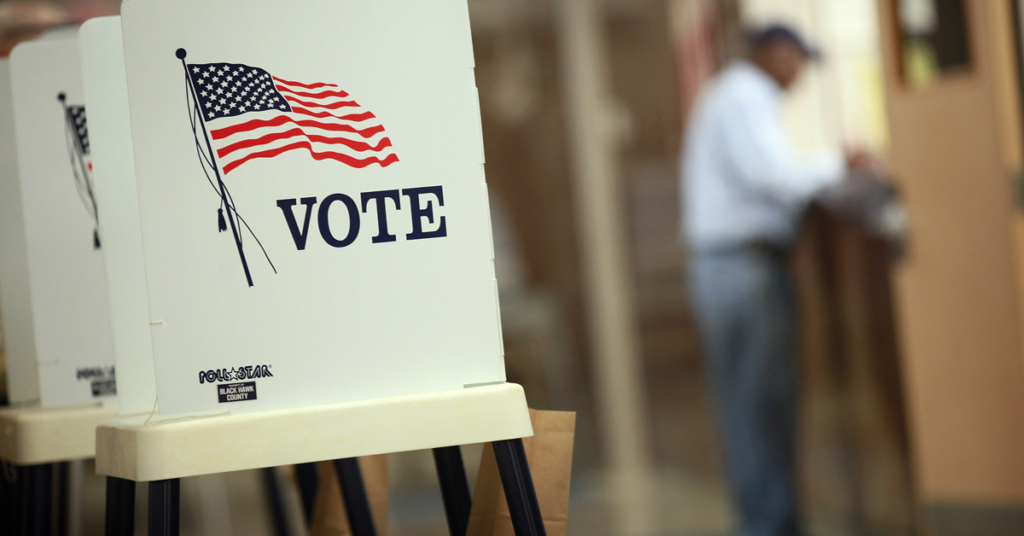
Two lawsuits are challenging Alabama’s newly approved congressional map, arguing it unlawfully dilutes the voting strength of African Americans with one majority-minority district out of seven. An organization announced a lawsuit Thursday on the same day that Alabama Gov. Kay Ivey signed the new congressional, legislative, and school board districts into law. A previously filed lawsuit by two state senators and several voters was also updated Thursday to challenge the new map. Alabama lawmakers this week approved a congressional map expected to maintain the current partisan balance: the seven-member congressional delegation with six Republicans elected from heavily white districts and one Democrat elected from the only majority-white district. Alabama has a population that is about 26% Black. A lawsuit backed by an organization aligned with a Democratic group says the plan violates the Voting Rights Act “because it strategically cracks and packs Alabama’s Black communities, diluting Black voting strength and confining Black voting power to one majority-Black district.” The lawsuit was supported by the National Redistricting Foundation, a nonprofit affiliate of the National Democratic Redistricting Committee, which is led by Eric Holder, who was attorney general under President Barack Obama. It is the second lawsuit filed over the issue. A pending lawsuit filed by two lawmakers and four voters argues the state should have two districts, where Black voters might have an opportunity “to elect candidates of their choice.” “Today, the Voting Rights Act no longer requires maintenance of a majority-black Congressional District in Alabama. To the contrary, the state cannot rely on the Voting Rights Act to justify splitting county boundaries when Districts drawn without racial gerrymandering provide Black voters constituting less than a majority, combined with reliably supportive white voters, an opportunity to elect candidates of their choice,” lawyers wrote in an amended complaint. During the recent special session, Republicans voted down Democratic efforts to create one swing congressional district with a significant centered in Birmingham that would be competitive between Republicans and Democrats. The swing district would have a population that is 40% Black. Republicans have maintained the approved maps comply with the Voting Rights Act and related court rulings. “I’m ready to defend these maps in court,” said Republican Sen. Jim McClendon, the co-chairman of the redistricting committee. McClendon argued the maps could not be drawn with two majority Black districts Republican Rep. Chris Pringle, the other co-chair of the redistricting committee, argued that having two districts — where African Americans were a significant portion of the population but under 50% — could do the opposite of what Democrats want by making them more competitive for Republicans. Republished with the permission of the Associated Press.
House passes bill bolstering landmark voting law
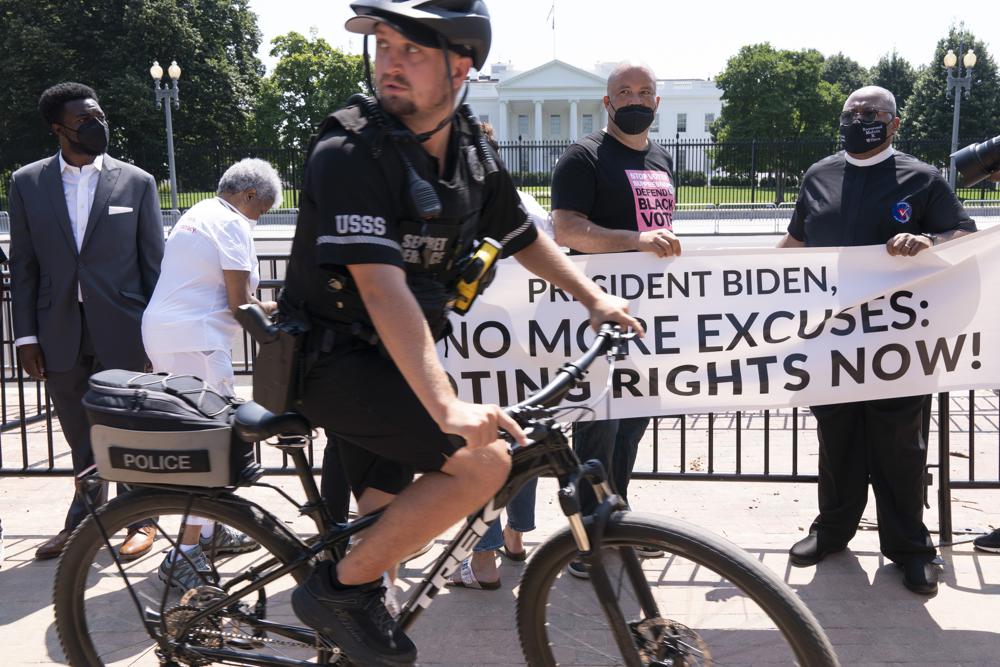
House Democrats have passed legislation that would strengthen a landmark civil rights-era voting law weakened by the Supreme Court over the past decade, a step party leaders tout as progress in their quest to fight back against voting restrictions advanced in Republican-led states. The bill, which is part of a broader Democratic effort to enact a sweeping overhaul of elections, was approved on a 219-212 vote, with no Republican support. Its Tuesday passage was praised by President Joe Biden, who said it would protect a “sacred right” and called on the Senate to “send this important bill to my desk.” But the measure faces dim prospects in that chamber, where Democrats do not have enough votes to overcome opposition from Senate Republicans, who have rejected the bill as “unnecessary” and a Democratic “power grab.” That bottleneck puts Democrats right back where they started with a slim chance of enacting any voting legislation before the 2022 midterm elections when some in the party fear new GOP laws will make it harder for many Americans to vote. But they still intend to try. Speaking from the House floor, Speaker Nancy Pelosi said it was imperative for Congress to counteract the Republican efforts, which she characterized as “dangerous” and “anti-democratic.” “Democracy is under attack from what is the worst voter suppression campaign in America since Jim Crow,” Pelosi said. The John Lewis Voting Rights Advancement Act, named for the late Georgia congressman who made the issue a defining one of his career, would restore voting rights protections that have been dismantled by the Supreme Court. Under the proposal, the Justice Department would again police new changes to voting laws in states that have racked up a series of “violations,” drawing them into a mandatory review process known as “preclearance.” The practice was first put in place under the Voting Rights Act of 1965. But it was struck down by a conservative majority on the Supreme Court in 2013, which ruled the formula for determining which states needed their laws reviewed was outdated and unfairly punitive. The court did, however, say that Congress could come up with a new formula, which is what the bill does. A second ruling from the court in July made it more difficult to challenge voting restrictions in court under another section of the law. The bill’s sponsor, Rep. Terri Sewell, said “old battles have indeed become new again,” enabled by the Supreme Court’s rulings. “While literacy tests and poll taxes no longer exist, certain states and local jurisdictions have passed laws that are modern-day barriers to voting,” said Sewell, an Alabama Democrat. In many cases, the new bill wouldn’t apply to laws enacted in the years since the court’s 2013 ruling. That likely includes the wave of new Republican-backed restrictions inspired by Donald Trump’s false claims of a stolen 2020 election. But if signed into law along with Democrats’ other election bill, the For the People Act, many of those restrictions could be neutralized — and likely prevented from getting approved again. Both laws would likely face legal challenges. In the short term, the vote Tuesday was expected to soothe restive Democratic activists who have been frustrated by inaction on the issue in the Senate. NAACP President Derrick Johnson said he was “encouraged” by the bill’s passage. But he also offered a thinly veiled threat, pledging to watch closely as the Senate takes it up and “keep track of every yea and every nay” vote. “Make no mistake, we will be there, on the ground in 2022, in every state that needs a new Senator,” he said in a statement. Democrats’ slim 50-50 majority in the Senate means they lack the 60 votes needed to overcome a filibuster. For months, progressives have called for scrapping the filibuster, but a number of moderate Democrats oppose the idea, denying the votes needed to do so. It’s also not clear that the John Lewis Voting Rights Advancement Act, as written, would be supported by all Democrats in the Senate, where there are no votes to spare. One provision in the bill would ban many types of voter ID laws, including those already on the books. That’s at odds with a proposal from West Virginia Sen. Joe Manchin, who is the chamber’s most conservative Democrat. He’s spent weeks working with Senate leadership to develop a more narrowly focused alternative to the For the People Act and has specifically called for a voter ID standard that would allow for people to use a document like a utility bill. Republicans, meanwhile, blasted the timing of the measure, noting that Pelosi called Democrats back from August recess to pass the bill, as well as to take votes on Democrats’ spending priorities when the U.S. is dealing with its chaotic withdrawal from Afghanistan. “If there’s any moment in time to put an election aside, if there’s any moment of time to put politics aside, I would have thought today was this day,” said House Minority Leader Kevin McCarthy. Conservatives also criticized the bill as a departure from the 1965 voting law, which used minority turnout data as well as a place’s history of enacting discriminatory voting laws when determining which places would be subject to preclearance. The new bill, instead, leans heavily on looser standards, such as using the number of legal settlements and consent decrees issued in voting rights cases to pull places into preclearance. That would, Republicans argue, play into the hands of Democrats, who have built a sophisticated and well-funded legal effort to challenge voting rules in conservative-leaning states. Rep. Michelle Fischbach, a Minnesota Republican, predicted it would be a boon for Democratic advocacy groups and trial lawyers, who would “file as many objections as possible to manufacture litigation.” “It empowers the attorney general to bully states and seek federal approval before making changes to their own voting laws,” she said. Republished with the permission of the Associated Press.
Democrats unveil plan to update landmark voting law
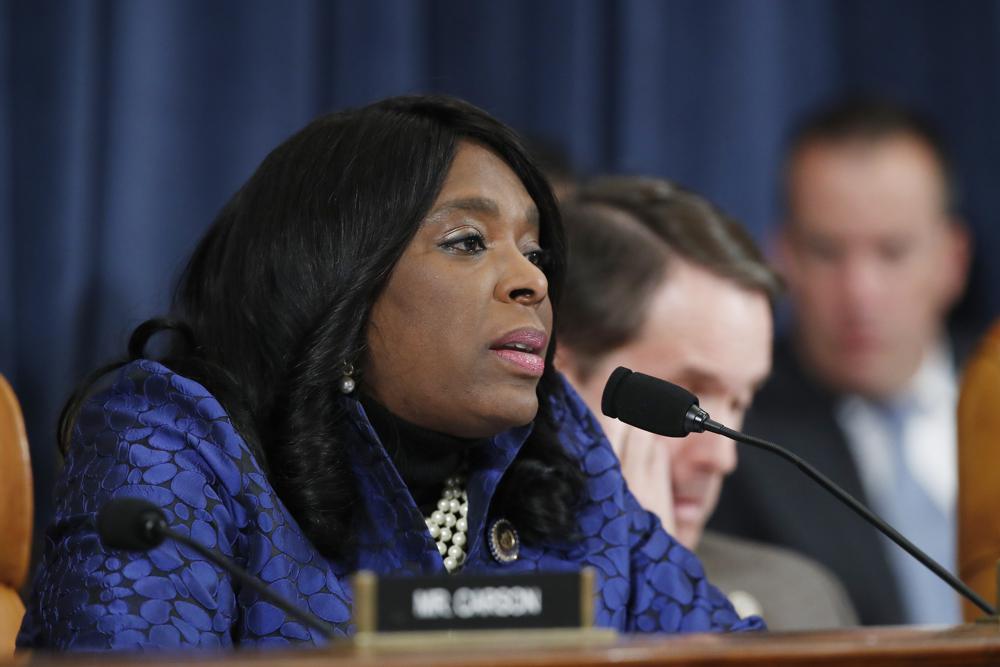
House Democrats on Tuesday put forward a new proposal to update the landmark Voting Rights Act, seeking against long odds to revive the civil rights-era legislation that once served as a barrier against discriminatory voting laws. The bill, introduced by Rep. Terri Sewell of Alabama, seeks to restore a key provision of the federal law that compelled states with a history of discrimination to undergo a federal review of changes to voting and elections. The Supreme Court set aside the formula that decided which jurisdictions were subject to the requirement in a 2013 decision and weakened the law further in a ruling this summer. House Speaker Nancy Pelosi, D-Calif., pledged to move quickly and said Democrats plan to pass the bill when the House returns next week. “With the attack on the franchise escalating and states beginning the process of redistricting, we must act,” Pelosi said in a statement. The push comes at a time when a number of Republican-led states have passed laws tightening rules around voting, particularly mail ballots. Democrats have sounded the alarm about the new hurdles to voting, comparing the impact on minorities to the disenfranchisement of Jim Crow laws, but they have struggled to unite behind a strategy to overcome near-unanimous Republican opposition in the Senate. The new House bill, known as H.R. 4, is named after Georgia congressman and civil rights leader John Lewis, who died last year. Sewell announced the introduction of the bill in front of the Edmund Pettus Bridge in Selma, Alabama, where Lewis was beaten during a civil rights march in 1965. The Voting Rights Act was signed into law a few months later. “We’re not looking to punish or penalize anyone. This is about restoring equal access to the ballot box. It’s about ensuring that Americans know their vote counts and their vote will count at the ballot box,” Sewell said. The Lewis bill outlines a new, expanded formula that the Department of Justice can use to identify discriminatory voting patterns in states and local jurisdictions. Those entities would then need to get DOJ approval before making further changes to elections. The bill also includes a provision designed to counter the summer’s Supreme Court ruling that made it harder to challenge potentially discriminatory voting changes. A companion bill pushed by Democrats, known as the For the People Act, has stalled in the Senate amid Republican opposition and disagreement among Democrats about whether to change procedural rules in the evenly divided Senate to get it passed. Democrats have argued both bills are needed to safeguard access to the ballot. They emphasize that the update to the Voting Rights Act would not apply to many voting changes already made by the states. The For the People Act, on the other hand, would create minimum voting standards in the U.S., such as same-day and automatic voter registration, early voting, and no-excuse absentee voting. The bill would also change various campaign finance and ethics laws. Senate Democrats have pledged to take up that more expansive bill when they return next month as the first order of business, though it is unclear how they can maneuver around GOP opposition. Republicans signaled they’ll try to stop the John Lewis Act much as they have the For the People Act. “This bill is a federal power grab and a gift to partisan, frivolous litigators who will use it to manipulate state laws and throw all federal elections into chaos, further undermining voter confidence in fair and accurate elections,” said Jason Snead, executive director of Honest Elections Project Action, a conservative advocacy group. Voting rights groups have been putting pressure on Democrats to eliminate or change the filibuster rules in the Senate, which requires 60 votes to proceed with most legislation, to get around the broad GOP opposition to the bills. That partisan opposition leaves Democrats well short of the needed support to advance them in the 50-50 Senate. At least two Democratic senators, Kyrsten Sinema of Arizona and Joe Manchin of West Virginia, have said they oppose eliminating the filibuster though discussions are ongoing about potential changes to the rules. Groups that back the voting measures are planning marches in several cities on Aug. 28 to call on the Senate to remove the filibuster rule. Republished with the permission of the Associated Press.
Body of civil rights icon John Lewis crosses Selma bridge

The late U.S. Rep. John Lewis crossed the Edmund Pettus Bridge in Selma, Alabama, for the final time Sunday as remembrances continue for the civil rights icon. The bridge became a landmark in the fight for racial justice when Lewis and other civil rights marchers were beaten there 55 years ago on “Bloody Sunday,” a key event that helped galvanize support for the passage of the Voting Rights Act. Lewis returned to Selma each March in commemoration. Sunday found him crossing alone — instead of arm-in-arm with civil rights and political leaders — after his coffin was loaded atop a horse-drawn wagon that retraced the route through Selma from Brown Chapel African Methodist Episcopal Church, where the 1965 march began. As the black wagon pulled by a team of dark-colored horses approached the bridge, members of the crowd shouted “Thank you, John Lewis!” and “Good trouble!” the phrase Lewis used to describe his tangles with white authorities during the civil rights movement. Some crowd members sang the gospel song “Woke Up This Morning With My Mind Stayed on Jesus.” Later, some onlookers sang the civil rights anthem “We Shall Overcome” and other gospel tunes. Lewis died July 17 at 80, months after he was diagnosed with advanced pancreatic cancer. Lewis served in the U.S. House of Representatives for Georgia’s 5th congressional district from 1987 until his death. The wagon rolled over a carpet of rose petals, pausing atop the bridge over the Alabama River in the summer heat so family members could walk behind it. On the south side of the bridge, where Lewis was beaten by Alabama state troopers in 1965, family members placed red roses that the carriage rolled over, marking the spot where Lewis spilled his blood and suffered a head injury. As a military honor guard lifted Lewis’ casket from the horse-drawn wagon into an automobile hearse, Alabama state troopers, including some African American ones, saluted Lewis. Franz and Ellen Hill drove more that four hours from Monroe, Louisiana, to watch the procession. Franz Hill, 60, said he remembers, as an African American child, watching news footage of Lewis and other civil rights marchers being beaten by law enforcement officers. “I had to come back and see John Lewis cross this bridge for the last time,” said Hill. “It’s funny to see the state troopers waiting on him for a whole different reason, to honor and respect him rather than beat the crap out of him.” There has been a movement to rename the Edmund Pettus Bridge after Lewis, but the idea has also faced opposition from those who note that Lewis wasn’t the only activist beaten on the bridge that day. Lewis’ body was then taken to the Alabama Capitol in the afternoon to lie in repose, retracing the route marchers took in the days after Bloody Sunday to demand justice from Alabama Gov. George Wallace. Bertha Surles and Edna Goldsmith stood along the highway between Selma and Montgomery to pay their final respects. Both carried signs, reading “Thank you.” “He fought for equal rights up unto his death,” said Surles, 70. She was in high school on Bloody Sunday and remembered watching the news footage of Lewis being beaten with horror. “They didn’t give up and something good came from it. Still need some improvement, but something good came from it.” Lewis left his family’s farm in Pike County, Alabama, in the 1950s to begin the fight against segregation and racial oppression. He received a hero’s welcome on his final stop in his home state. After tracing the route of the completed Selma to Montgomery march, an honor guard carried Lewis’ flag-draped casket into the Alabama Capitol, which had served as the first capitol of the Confederacy. Peggy Wallace Kennedy, the daughter of former segregationist governor Wallace, was among those in the Capitol for the receiving ceremony, along with most of Alabama’s congressional delegation. Alabama Gov. Kay Ivey placed a wreath of flowers shaped like the Alabama flag by the casket. U.S. Rep. Terri Sewell placed a wreath shaped like the American flag. His family members, many wearing shirts with the phrase “Good Trouble,” were led first into the Capitol before the public viewing later in the afternoon. A line of people, some carrying umbrellas for shade, waited under the brutal midday Alabama sun to go inside and pay their respects. After the viewing, his casket was carried out as the song “Amazing Grace” was sung. Bernice King, the daughter of Martin Luther King Jr., spoke at a vigil for Lewis across the street from the Capitol, just a block away from the church her father led during the civil rights movement. Standing in front of large letters, spelling out the word “VOTE,” she recalled the man her father called “the boy from Troy” and her family called Uncle John. “The most astounding thing about Congressman Lewis being left for dead on that bridge (in 1965) is how he got up both physically and spiritually. When he recovered, he recovered without a trace of bitterness or hostility or without losing hope in our Democracy,” Bernice King said. She called for today’s young activists to take inspiration from Lewis’ non-violent leadership and for Congress to honor Lewis’ life legacy by restoring and expanding the Voting Rights Act of 1965. “This would be a fitting tribute and a way to honor this non-violent warrior who said the vote is the most powerful tool that we have,” she said. A series of events began Saturday in Lewis’ hometown of Troy, Alabama, to pay tribute the late congressman and his legacy. He will lie in state at the U.S. Capitol next week before his private funeral Thursday at Atlanta’s historic Ebenezer Baptist Church, which the Rev. Martin Luther King Jr. once led. ___ This story corrects the spelling of the first name of Franz Hill. Republished with the permission of the Associated Press.
Democratic presidential hopefuls honor Selma march
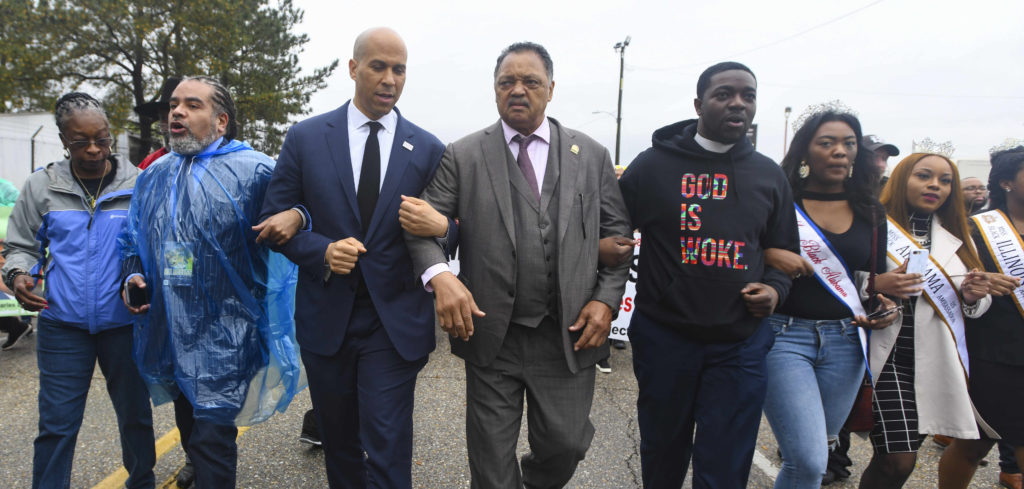
Thunder rolling above Brown Chapel AME Church, Democratic presidential candidate Cory Booker warned Sunday of a looming threat to American democracy and called for protecting the legacy of the civil rights movement with love and action. “It’s time for us to defend the dream,” Booker said in a keynote speech at Brown Chapel, which two generations ago was the starting point of a peaceful demonstration in support of voting rights that ended in beatings on the Edmund Pettus Bridge. The infamous “Bloody Sunday” on March 7, 1965, galvanized support for the passage of the Voting Rights Act that year. “It’s time that we dare to dream again in America. That is what it takes to make America great. It is up to us to do the work that makes the dream real,” said Booker, a New Jersey senator and one of three White House hopefuls who participated in events commemorating the march. Saying America faces challenges, Booker said: “People want to make it just about the people in the highest offices of the land. . People who traffic in hatred, people in office that defend Nazis or white supremacists, people that point fingers and forget the lessons of King. What we must repent for are not just the vitriolic words and actions of bad people, but the appalling silence and inaction of good people.” Also visiting Selma on Sunday were Sens. Bernie Sanders of Vermont and Sherrod Brown of Ohio. Joining them was Hillary Clinton, the Democratic nominee in 2016. Booker and Brown, along with Clinton and civil rights leader Jesse Jackson, marched with dozens of others Sunday afternoon to Edmund Pettus Bridge. Sanders had left for a campaign event in Chicago. The throng of marchers had set out from the church and sang freedom songs under a stormy sky as they headed to that sacred spot over the Alabama River to commemorate the peaceful protesters who were met with tear gas and clubs wielded by state troopers. This year’s commemoration came in the early days of a Democratic presidential primary campaign that has focused heavily on issues of race. Several candidates have called President Donald Trump a racist, while others have voiced support for the idea of reparations for the descendants of enslaved black Americans. Booker and Sanders have already announced their campaigns. Brown is still considering a White House bid. The three gathered for a unity breakfast in Selma to pay homage to its civil rights legacy and highlight how the movement shaped their personal narratives. For the New Jersey senator, much of the day felt personal. In Brown Chapel he sat next to Jackson, for whom he cast his first ballot as an 18-year-old during Jackson’s 1988 presidential campaign. He later marched to the bridge alongside Jackson, their arms locked together. In his speech, Booker linked the 1965 Selma demonstration to the lawyer who volunteered to help his family buy a home in a white neighborhood after they were discriminated against and repeatedly denied. “I would not be here if it wasn’t for marchers on a bridge who inspired a man a thousand miles away in New Jersey,” he said. “The dream is under attack. You honor history by emulating it, by us recommitting ourselves to it.” Brown, currently on a “Dignity of Work” tour inspired by King, returned to Selma for the fifth time. He frequently draws connections between civil rights and worker’s rights. A former secretary of state in Ohio, Brown also has a reputation as a leader on expanding voter participation. “We need to understand what happened here and we need to talk about it so we keep fighting on these issues,” Brown told reporters at the breakfast. “It’s clear we make progress and then we fall back because of Republican attacks on voting rights.” Claiming that the Georgia governor election was stolen from Democrat Stacey Abrams, Brown said: “It’s not just a Southern issue, of course. In the north we see all kinds of changes in voting laws. We see suppression of the vote in 2016, purging of voters in my state in a big way. This fight continues. It’s become personal in many ways because voting rights are so important to our country.” Sanders attended the 1963 March on Washington, which featured the Rev. Martin Luther King Jr.‘s “I Have A Dream” speech. Sanders has highlighted his civil rights and activist background as a young man at the University of Chicago. He is working to strengthen his relationship with black voters, with whom he struggled to connect in the 2016 Democratic primary that Clinton won. Appearing at Chicago’s Navy Pier, Sanders on Sunday night recalled his work with the campus chapter of the Congress of Racial Equality, protesting discrimination and housing segregation. He led one of the first sit-ins in the North and was arrested at a demonstration against segregation in Chicago schools in 1963. Sanders said while the Chicago activism was significant at the time, it didn’t compare to what was happening in the South. “We were protesting,” he told a rally of thousands. “They were putting their lives on the line, and some were getting killed.” “I must say that it is incomprehensible to me that, in the year 2019, we continue to have a president, a Supreme Court and Republican governors who still are trying to deny people of color and poor people the right to vote,” he said. “The reason I tell you all of this is because my activities here in Chicago taught me a very important lesson,” he said. “And that is that whether it is the struggle is against racism, or sexism, or homophobia, or corporate greed, or environmental devastation, or war and militarism or religious bigotry — real change never takes place from the top on down. It always takes place from the bottom on up when people, at the grassroots level, stand up and fight back.” In Selma, Clinton told those at Brown Chapel that the absence of crucial parts of the
On its 53rd anniversary, Terri Sewell says Voting Rights Act must be restored
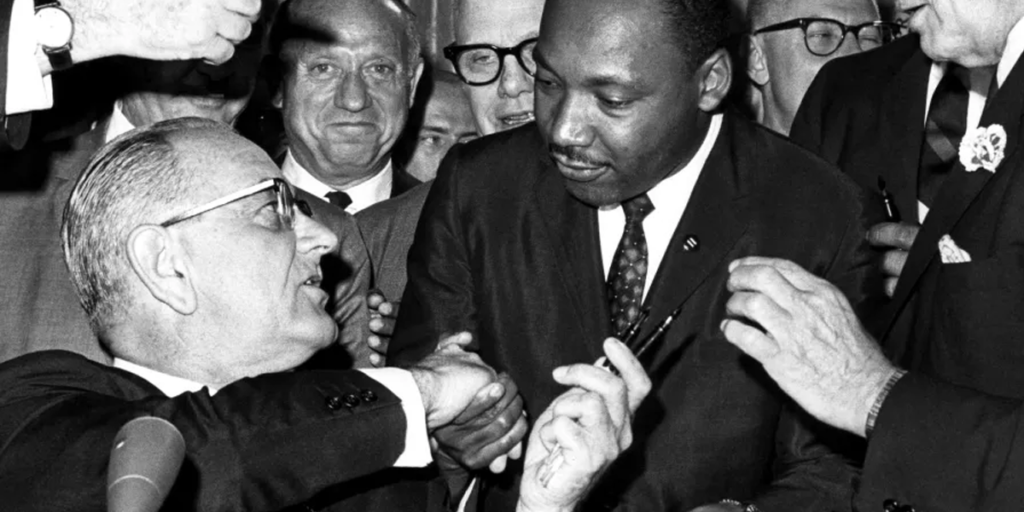
Monday, August 6, marks the 53rd anniversary of the enactment of the Voting Rights Act of 1965 (VRA). The VRA abolished restrictions on black Americans voting in federal, state and local elections. In 2013, key components of the law were removed by the Supreme Court in its Shelby County v. Holder decision. Alabama 7th District U.S. Rep. Terri Sewell on Monday said the the law must be restored. “Today’s anniversary is a reminder that foot soldiers in Alabama and across the country fought, bled, and died for our right to vote,” saidSewell. “Right now, their work is under attack as states across the country pass strict voter ID laws, gerrymander electoral districts, and purge voters from their voter rolls. As we recognize the impact that Shelby County v. Holder has had on our democracy and its damaging effect on voter access, let us recommit to action in the face of voter suppression. We must restore the full protections of the Voting Rights Act to keep our elections free and fair. In June 2017, Sewell sponsored the Voting Rights Advancement Act (VRAA), which seeks to restore full protections to the Voting Rights Act of 1965 following Shelby County v. Holder. To address the Supreme Court’s concerns with the VRA, the VRAA would create a new coverage formula which requires federal oversight of states with repeated voting rights violations in the last 25 years. If passed, 13 states nationwide, including Alabama, would be subject to federal election oversight due to a recent history of voter discrimination. It would also require states with a recent history of voter discrimination to seek approval from the Department of Justice before making any changes to their electoral laws.
Commemoration of ‘Bloody Sunday’ set in Alabama
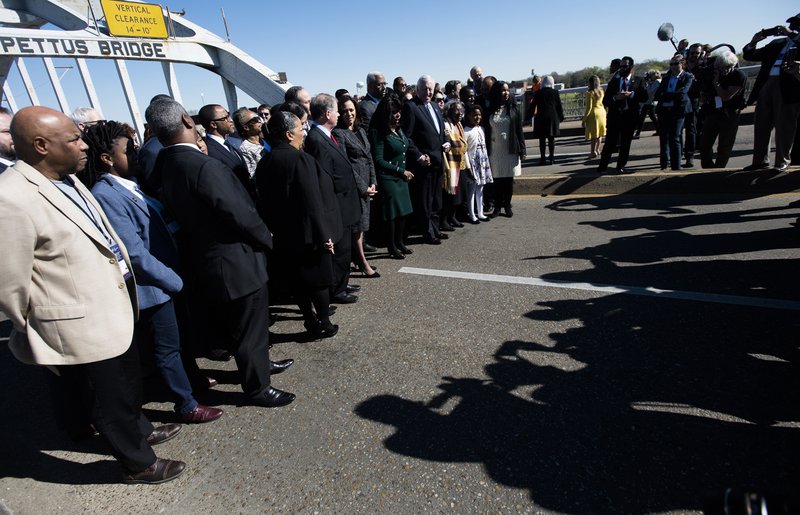
Several members of Congress have joined civil rights activists and others for the annual commemoration of a day of racial violence in Selma dating to 1965. A bipartisan group including Rep. John Lewis of Georgia led the crossing of the Edmund Pettus Bridge on Sunday afternoon. It was to recall “Bloody Sunday,” when voting rights protesters were attacked by police as they attempted to cross the bridge. Lewis, then a young organizer, was among those injured then. That violence set the stage for the Selma-to-Montgomery march, which helped build support for congressional approval of the Voting Rights Act months later. The annual celebration drew tens of thousands of people in 2015, when then-President Barack Obama spoke near the base of the bridge as former President George W. Bush listened. Republished with permission of The Associated Press.
National ‘Ride to Revive’ Section 5 of the Voting Rights Act to leave from Selma
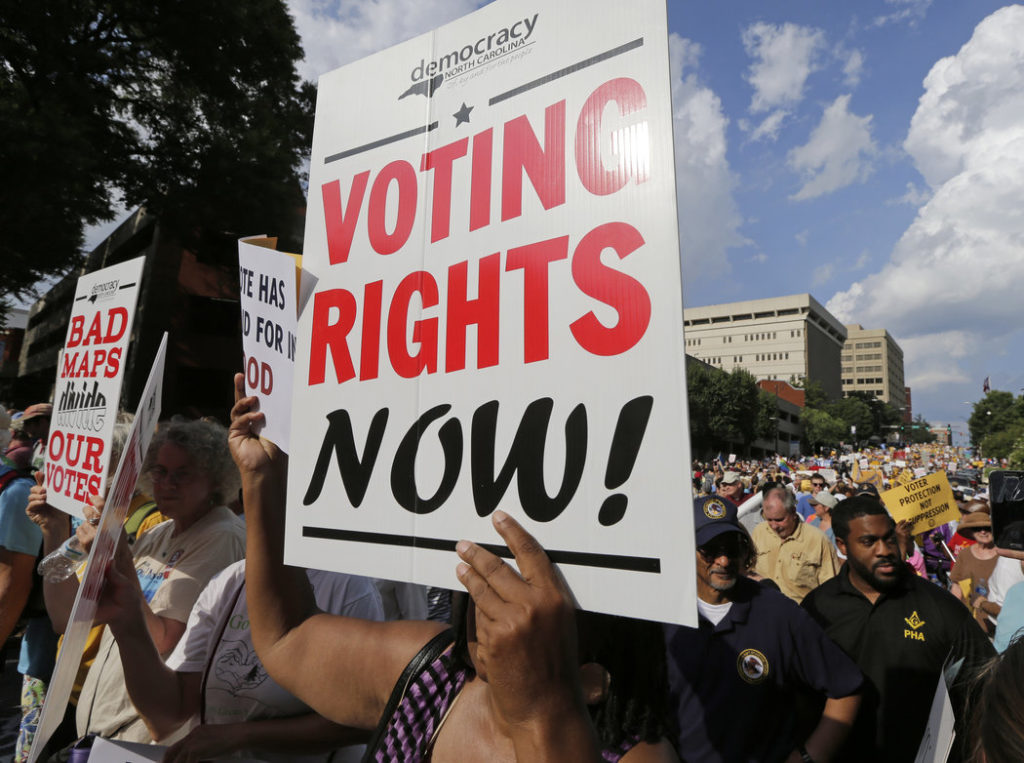
On June 24, 2017, the 4th Anniversary of the Supreme Court’s reversal of section 5 of the Voting Rights Act, advocacy groups from across the country will come together in Selma, Ala. to embark on the “Ride to Revive” — a journey to the nation’s capital where they will endeavor to draw attention to and restore the invalidated section of the Voting Rights Act. Upon their arrival to Washington, D.C. on June 27, the S.O.S. Movement for Justice & Democracy, along with a coalition of 41 organizations, including Women of Will and NAACP, will hold a rally a press conference at the U.S. Capitol to discuss the need for restoring Section 5. “Every issue is a voting issue,” Catrena Norris Carter, one of the event’s organizers, said in a press release. “Many of the massive problems we face in the South and the Nation can be addressed by progressive voting rights laws and practices. Our democracy depends on us, the people and the South.” The group will begin their trek at the historical Edmund Pettus Bridge in Selma — the site which played a critical role in securing the Voting Rights Act of 1965. On March 7 of that year, a group of roughly 525 African American protesters planned to cross the bridge on their civil rights march to Montgomery to demand the right to vote. At the bridge they were met by more than 50 state troopers and a few dozen men on horseback. When the demonstrators refused to turn back, they were brutally beaten, leaving at least 17 hospitalized, and 40 others injured. The violent attack, dubbed “Bloody Sunday,” shocked the nation and galvanized Congress to pass the Voting Rights Act, the landmark piece of federal legislation that prohibits racial discrimination in voting. In the summer of 2013, the Supreme Court invalidated a section of the law — freeing Alabama and eight other states, mostly in the South, to change election laws without advance federal approval. Prior to that these nine states had to get “pre-clearance” from the U.S. Justice Department to make changes to voting districts.
Supreme Court order unlikely to deter voting restrictions
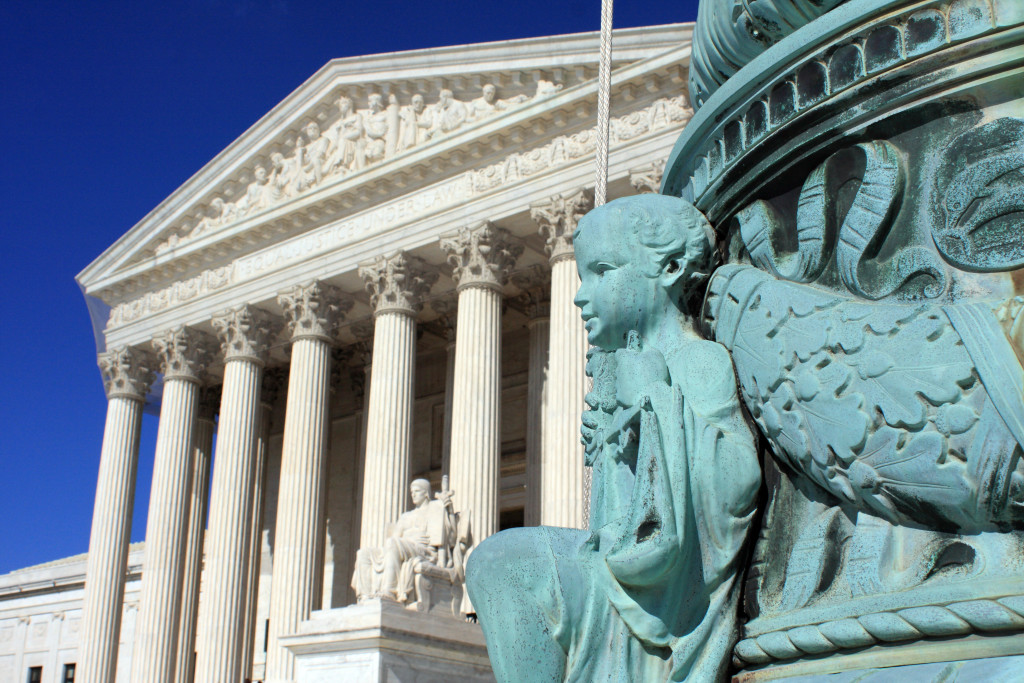
The Supreme Court’s refusal to breathe new life into North Carolina’s sweeping voter identification law might be just a temporary victory for civil rights groups. Republican-led states are continuing to enact new voter ID measures and other voting restrictions, and the Supreme Court’s newly reconstituted conservative majority, with the addition of Justice Neil Gorsuch, could make the court less likely to invalidate the laws based on claims under the federal Voting Rights Act or the Constitution. The justices on Monday left in place last summer’s ruling by the 4th U.S. Circuit Court of Appeals striking down the law’s photo ID requirement to vote in person and other provisions, which the lower court said targeted African-Americans “with almost surgical precision.” But Chief Justice John Roberts noted that the court’s decision to stay out of the case rested on a partisan dispute over who had the authority to present North Carolina’s case to the court, not the justices’ views on the substance of the issue. Indeed, before Gorsuch joined the court, the other eight justices split 4-4 over whether to allow the challenged provisions to remain in effect despite the court ruling striking them down. In January, when the high court rejected a Texas appeal over its voter ID law, Roberts practically invited Texas Republicans to bring their appeal back to the Supreme Court after lower court consideration of the issue is finished. “The issues will be better suited for certiorari review at that time,” Roberts wrote, using the Latin term for the court’s process of deciding whether to hear a case. Two earlier Supreme Court decisions paved the way for the wave of voter ID laws that are now in place in 32 states, according to the National Conference of State Legislatures. Roberts was part of a conservative-led decision upholding Indiana’s voter ID law in 2008 and he was the author of the court’s 5-4 decision in 2013 that gutted a provision of the federal Voting Rights Act that had required North Carolina, Texas and other states, mainly in the South, to get approval before changing laws dealing with elections. Republicans in North Carolina and Texas moved to enact new voting measures after the Supreme Court ruling. Voters, civil rights groups and the Obama administration quickly filed lawsuits challenging the new laws. Advocates of requiring voters to show identification at the polls say it is a prudent, painless way to deter voter fraud. Opponents contend that in-person voter fraud has historically not been a problem and that poorer and minority voters, who tend to support Democrats, are more likely to lack driver licenses and other acceptable forms of identification. Roberts’ and the other conservatives’ track record in voting cases suggests they’ll be “quite skeptical of voting rights claims,” said election law specialist Richard Hasen, a law professor at the University of California at Irvine. “You could certainly see a five-justice majority overturning a case like this,” Hasen said of the North Carolina appeal. He acknowledged that Gorsuch himself has yet to weigh in on the topic. A conservative defender of the voting laws agreed. “I’d think challengers to voter ID laws would be extremely nervous about any such case coming to the court,” said Hans von Spakovsky, a senior legal fellow at the Heritage Foundation. Already this year, Arkansas, Iowa and North Dakota have approved voter ID laws, according to the Brennan Center for Justice at New York University. Georgia and Indiana are among states that have added other voting restrictions to their identification laws, the Brennan Center said. The voter ID issue itself could return to the court in the next year or two in cases from Texas and Wisconsin. The 5th U.S. Circuit Court of Appeals already has ruled that Texas’ law violates the Voting Rights Act, but a broader challenge to the law is pending at the New Orleans-based appeals court. The 7th U.S. Circuit Court of Appeals appeared inclined to uphold Wisconsin laws requiring voter ID and limiting early voting when it heard arguments in February. Republican Gov. Scott Walker signed the measures into law in 2011. Republished with permission of The Associated Press.
Rumors surround Justice Anthony Kennedy exit, but he’s not talking

As one justice settles into his new job at the Supreme Court, is another about to leave? Eighty-year-old Justice Anthony Kennedy is so far refusing to comment on speculation that he may soon retire after 29 years on the court. But that hasn’t stopped President Donald Trump and, obliquely, the Republican senator in charge of high court confirmation hearings from weighing in on the prospect that Kennedy could step down as soon as this spring or summer. If not this year, several former law clerks said they would not be surprised to see the justice retire in 2018. “I’ve heard the same rumors that a lot of people have heard. And I have a lot of respect for that gentleman, a lot,” Trump told The Washington Times in an interview published Sunday. Sen. Chuck Grassley of Iowa, chairman of the Senate Judiciary Committee, told reporters last month, “I would expect a resignation this summer.” He did not name any names but cited a “rumored” retirement. Kennedy’s departure would give Trump a second Supreme Court vacancy and the chance to cement conservative control of the court for a decade or more. Justice Neil Gorsuch, Trump’s first nominee, joined the court last month. Trump said he would choose from the same list of candidates he unveiled during the campaign from which he plucked Gorsuch. Kennedy has been the crucial swing vote on the high court for more than a decade. He has sided with the liberal justices on gay rights and abortion rights, as well as some cases involving race, the death penalty and the rights of people detained without charges at the Guantanamo Bay naval base. He has written all the court’s major gay-rights decisions, including the 2015 ruling that declared same-sex marriage is a constitutional right nationwide. He also has been a key vote when conservatives have won major rulings on the outcome of the 2000 presidential election in favor of George W. Bush, gun rights, limiting regulation of campaign money and gutting a key provision of the landmark federal Voting Rights Act. There are few outward signs that Kennedy is getting ready to retire. He has hired his allotment of four law clerks for the term that begins in October and he is planning to spend part of the summer as he typically does, teaching a law school class in Salzburg, Austria. But Kennedy scheduled his reunion of law clerks a year earlier than usual, on the last weekend in June. That change, first reported by the Above the Law legal blog, first fueled speculation that Kennedy is considering retirement. Kennedy sent his former clerks an invitation in September, two months before the election. Supreme Court spokeswoman Kathy Arberg explained the earlier reunion as a chance to mark Kennedy’s 80th birthday before the justice turns 81 in July. Some of the roughly 100 clerks who have worked for Kennedy at the Supreme Court thought there might be more to the change. One former clerk, speaking on condition of anonymity in adherence to long-held court tradition on clerk-justice relationships, said he thought the reunion was scheduled in that manner because of the thought that Kennedy would be retiring. The same clerk said he also would not be surprised if Kennedy remains on the bench for another year. Other clerks, who also would not agree to be named, said Kennedy naturally is considering retirement because he is past his 80th birthday and thinks that some of his colleagues remained in their jobs too long. A nominee of President Ronald Reagan, Kennedy also would prefer to be replaced by a Republican, those clerks said. It is unclear how Trump’s election may have shaped Kennedy’s thinking. But he appears to have a warmer relationship with Trump and his family than was known or necessarily expected. Kennedy invited Ivanka Trump to a February argument at the court, where she and her daughter sat in a section reserved for justices’ guests. Kennedy’s younger son, Gregory, spent time on the Trump team that worked at NASA beginning with Trump’s inauguration. Trump and Kennedy themselves had a brief but warm exchange on the floor of the House of Representatives following Trump’s first address to Congress in February. Few obstacles seem to stand in the way of confirming a new justice this year or next. Republicans control the Senate, and after changing the rules, have wiped out the filibuster for Supreme Court nominees and the need for 60 votes to defeat it. Among the reasons Kennedy could remain on the bench are the chance to continue to serve with Gorsuch, his onetime clerk; put some space between vacancies that can upset the settled ways of the court, and control the decisive vote on a court that is split between liberals and conservatives on a range of high-profile issues. The other two older justices, Ruth Bader Ginsburg, 84, and Stephen Breyer, 78, are Democratic appointees who would not appear to be going anywhere during a Trump administration if they can help it. “I love my job,” Ginsburg told a Georgetown University audience last week. Republished with permission of The Associated Press.
Robert Bentley paramour Rebekah Mason behind effort to shut DMV offices in black counties, new report shows

Rebekah Mason, Gov. Robert Bentley’s former top adviser and illicit lover, pushed to close 31 offices of the Alabama Department of Motor Vehicles in mostly black counties. After protests by civil rights activists, including Jesse Jackson, the politically motivated effort was later overturned, resulting in a federal investigation. The relationship between Bentley and Mason and how it impacted the DMV closure plan was the focus of a new 131-page report, which the Birmingham News reports was released by investigators examining impeachment proceedings against the governor. The report, from lead investigator Jack Sharman, found Mason “proposed closing multiple driver’s license offices throughout the State” and asking Alabama Law Enforcement Agency to “put together a plan.” Sharman also noted that former ALEA head Spencer Collier – well-aware of Mason’s intent – was instructed to have a plan “rolled out in a way that had limited impact on Government Bentley’s political allies.” Collier reported the closure plan to Luther Strange, Alabama’s then-Attorney General, expressing concern over possible Voting Rights Act violations. The News reports that Collier eventually agreed to the closure plan, but through “objective measure based on processed transactions per year to determine which offices to close.” Mason’s plan, if enacted, would of save the state $200,000 – a small amount in a General Fund showing typical annual shortfalls between $100 million and $200 million. Bentley agreed to the plan, the report said, with a single exception: removing state Sen. Gerald Dial’s district from the list. Dial told the News he never spoke with Bentley about any closures and is not aware of which county was under consideration. The plan set off an investigation by the U.S. Department of Transportation, which discovered that the closures would hit rural counties hardest and disproportionately affect black neighborhoods, a violation of the 1964 Civil Rights Act. The NAACP, the nation’s leading civil rights organization, filed a lawsuit prompting the federal review. At first, Bentley was critical of DOT involvement in the investigation, which he said was political in nature. But after striking an agreement between state and federal agencies, ALEA agreed it would extend service hours for DMV offices in Alabama’s so-called “Black Belt.”
Supreme Court revives challenge by black voters in Virginia

The Supreme Court gave new life Wednesday to a challenge by African-Americans in Virginia who say lawmakers packed some legislative districts with black voters to make other districts whiter and more Republican. The justices tossed out the part of a lower court ruling that upheld 11 districts in which African-Americans made up at least 55 percent of eligible voters. Justice Anthony Kennedy said in his majority opinion that the three-judge federal court used the wrong legal standard when it determined that race did not play too large a role in creating the 11 districts. The high court upheld one challenged district in which the lower court found that race was an important factor and that lawmakers were justified in considering race. For all the districts at issue, the state argued that the 55 percent threshold was necessary so that minority voters could elect a candidate of their choice, an important consideration under the federal Voting Rights Act. The black voters who sued over the state’s 2011 districting plan argued that it diluted the voting power of African-Americans. Virginia Gov. Terry McAuliffe, who took office after the redistricting and backed the lawsuit, said the decision is a “victory for democracy in Virginia,” according to McAuliffe spokesman Brian Coy. “The governor has long believed that Virginia’s legislative lines are unconstitutionally racially gerrymandered,” Coy said. Marc Elias, the lawyer for the Virginia voters, said the ruling was a big win because it established that states could employ traditional principles of redistricting that include geographically compact districts and still be open to a challenge that they engaged in racial gerrymandering. But the justices did not take up Elias’ request that the Supreme Court strike down the districts. It is now up to the lower court to figure out whether the districts were improperly drawn. Because the court left it to the lower court to sort out, election law expert Richard Hasen at the University of California at Irvine law school termed the outcome “more of a punt than a major decision.” Chief Justice John Roberts and Justices Stephen Breyer, Ruth Bader Ginsburg, Elena Kagan, Anthony Kennedy and Sonia Sotomayor joined Kennedy’s opinion. Roberts’ decision to join the majority was notable because he often is on the other side in cases involving race and electoral district. Justices Samuel Alito and Clarence Thomas, who also are skeptical of the use of race in drawing political districts, agreed with most of the outcome of the case, but differed with their colleagues on the details. The Virginia case was one of two redistricting disputes the court heard in December. The other, involving North Carolina congressional districts, remains undecided. Republished with the permission of The Associated Press.


